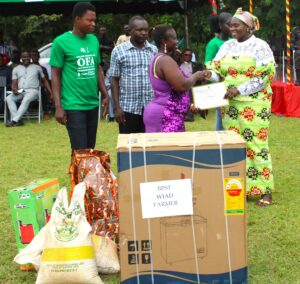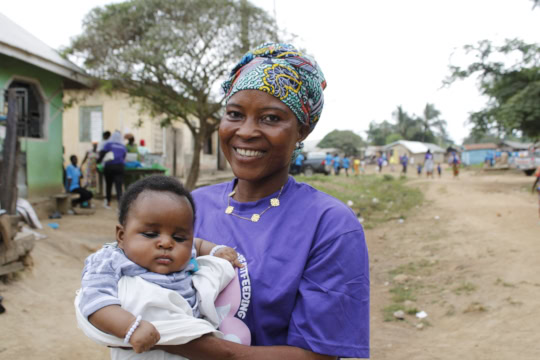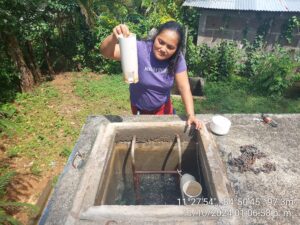Chlorinator Cleanses La Culebra

Miguel’s family stays healthier with clean water
Miguel and his wife Griselda live in a compact cement house in La Culebra, a rural village, home to just over one thousand people. In July of 2013, Miguel petitioned the people of La Culebra to install a CTI-8 water chlorination system after attending a purification demonstration presented by Self Help International employees. He promptly called a meeting amongst all 228 houses in the area, citing rampant acute diarrheal disease and other water-borne illnesses as dire concerns for the wellbeing of the entire community.
“We immediately held a meeting and voted on the purchase of the system… people were sick of being sick… they were sick of seeing their children sick”, he says sternly. His three children, ranging from ages 4 to 10, shoot marbles on the floor of the house as he continues, pausing between thoughts. “We have all had diarrhea and rash breakouts from drinking the impure water,” he states, gesturing to the children. “It was filthy… everyone’s children suffered the same symptoms… it was always worse for them than the adults”.
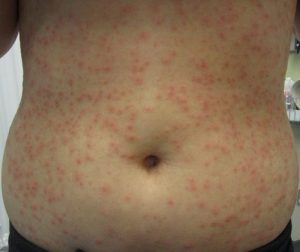
Granos de piel por agua: rash from unclean water
“Granos de piel por agua” is the local name for the rash contracted by ingesting or washing oneself with contaminated water. Affected areas can be local, or cover the entire body. Symptoms include itchiness and moderate pain – if irritated, the rash can lead to more serious infection. The ailments came as a result of fecal particles tainting La Culebra’s water supply.
Self Help International’s Water Program Director, Orlando Montiel Salas, conducted a basic demonstration of contamination levels collecting water samples in petri dishes, then having samples analyzed in a nearby laboratory.The untreated sample that the community had been ingesting came back from the lab with 14 fecal cultures. Contamination levels between 10 and 100 are considered to be an extreme health risk. Each dot in the petri dish (pictured in attachment) is a thriving colony of fecal bacteria from La Culebra’s initially non-chlorinated water source.
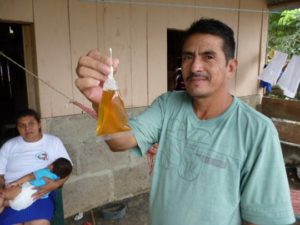
Miguel holds up contaminated crude water in 2013
After viewing the fecal content of the crude water, over 90% of the community immediately voted in favor of the purchase of the CTI-8 system, recognizing the effectiveness and the low cost of production and maintenance. Since the assembly, Miguel has become the leader of “Comité de Agua Potable y Saneamiento” (CAPS) in La Culebra, a volunteer group dedicated to ensuring basic levels of local water sanitation. He says that a variety of people within the community have similarly volunteered to clean and maintain the purification system. “Every month of purified water now costs each household only 30 Cordobas [roughly USD $1]… other systems are more expensive and the water tastes strange”.
While Miguel speaks fervently and fluidly on the functions of the CTI-8 system, as well as the duties of CAPS members, his wife Griselda is more interested in discussing how her life, and the lives of her children, have been changed as a result of Self Help International’s water purification initiative. Bobbing her youngest son on her lap, she states, “We knew it [water chlorination] was necessary, but we did not think we could afford it until Self Help came for the demonstration… I feel safe knowing my children don’t worry about getting sick from drinking or washing themselves. It has been one and a half years since the installation; it has been one and a half years of comfort”
Recently, Miguel and Griselda have received increasing amounts of positive feedback and interest from visitors in neighboring communities. With a proud grin, Griselda states, “A teacher I work with travels all the time and says the water in La Culebra is the best in the region!” Miguel nods his head in agreement, explaining that men from surrounding villages have begun asking about La Culebra’s water, “Word of mouth travels quickly here, very quickly. When the CTI-8 is this efficient and this cheap, why wouldn’t you want it?” Affordable access to potable water is often taken for granted amongst more developed populaces, but the people of La Culebra still celebrate this recent innovation. Miguel concludes very simply, “It has changed our lives and bettered our community”.

